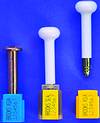
As part of the Customs-Trade Partnership Against Terrorism (C-TPAT) initiative, US Customs recently formally launched the requirement that all maritime cargo containers entering the US from foreign points of origin must be secured with a high-security barrier seal, which conforms to the technical specifications as set out in the ISO/PAS 17712 document.

Vikela Aluvin MD, Kevin Norwitz, says that this is a very significant development for both the security sealing industry and the logistics industry.
"From June this year, if containers coming in to the US do not have the correct seals, they will be set aside for special scrutiny, significantly delaying delivery," warns Norwitz.
He adds that before choosing a seal, exporters must ensure that the seals are ISO-17712 compliant for tensile strength, shear, bend and impact and that this should be validated by a certified third party.
C-TPAT is a joint (US) government-business initiative to build cooperative relationships that strengthen overall supply-chain and border security.
C-TPAT recognises that Customs can provide the highest level of security and realises that this can only be achieved through close cooperation with the ultimate owners of the supply chain - the exporters, carriers, brokers, warehouse operators and manufacturers.
Through this initiative, Customs is asking businesses to ensure the integrity of their security practices and to communicate their security guidelines to their business partners within the supply chain.
"This affects security seals directly," says Norwitz. "US Customs acceptance no longer exists for security seals. This has now been superseded by C-TPAT and ISO/PAS 17712.
"C-TPAT affects the entire security sealing industry as it stipulates that both the security sealing products themselves and those who manufacture and supply them must conform to the new guidelines.
These new requirements are set out in document ISO/PAS17712, which is a draft International Standard that establishes 'uniform procedures for the classification, acceptance, and withdrawal of acceptance of mechanical freight container seals'.
"Compliance with the ISO standard is now a critical requirement for all exporters to the US and shippers and their customers should all be cognisant of the seals they are using and of the consequences of not using the correct ones," says Norwitz.
Vikela Aluvin represents several international manufacturers that produce seals that are compliant with C-TPAT stipulations.

© Technews Publishing (Pty) Ltd. | All Rights Reserved.